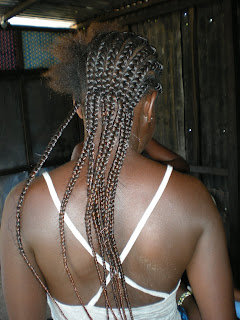In the Congo, women's hairdo's are part of their dressing. At first it is hard to recognize our friends, because their hair always changes. Women wear a lot of wigs and have elaborate braids and do's with their natural hair and with synthetic hair woven in.
These braids last about ten days -- if the women wash them too much, they become fuzzy, so this is not a long term hair-do!
This is the typical man-do -- shaved or short!
More hair styles in the future!









































